- Home
- David Sedaris
Squirrel Seeks Chipmunk: A Modest Bestiary Page 2
Squirrel Seeks Chipmunk: A Modest Bestiary Read online
Page 2
When her muzzle grew more white than brown, the chipmunk forgot that she and the squirrel had had nothing to talk about. She forgot the definition of “jazz” as well and came to think of it as every beautiful thing she had ever failed to appreciate: the taste of warm rain; the smell of a baby; the din of a swollen river, rushing past her tree and onward to infinity.
The Toad, the Turtle, and the Duck
The complaint line started at the edge of the swamp and stretched westward, ending, where the turtle finally arrived, at the base of a charred pine stump. He fell into place behind a glassy-eyed toad and had just commenced a jaw-aching yawn when a duck showed up and took the position behind him, muttering, “What a bunch of idiots.”
The turtle, his mouth still open, nodded in agreement.
“This is my second time in this line, can you believe it?” groused the duck. “First they told me I wouldn’t need any ID, then, after I waited almost three hours, this ball-busting river rat goes, ‘I’m sorry, sir, but if you don’t have some form of identification, there’s nothing I can do.’
“I was, like, ‘Why the hell didn’t you tell me that earlier?’ And she was all, ‘If you can’t be civil, I’m afraid I’m going to have to ask you to leave.’ ”
The turtle groaned in sympathy, as something similar had once happened to him. “It’s the oldest trick in the book,” he said. “They screw up, but somehow you’re the problem.”
“I said to her, ‘You want civil, try working for a company that doesn’t give everyone the goddamn runaround!’ ” the duck continued. “ ‘You can’t very well complain about our complaining when you’re the one who’s given us something to complain about.’ ”
“Well put,” said the turtle, who was, he’d later admit, genuinely impressed. “You don’t expect such clarity from a duck, or any bird, really, but this one totally nailed it,” he’d tell his wife when he got home that evening.
It was here that the toad entered the conversation. “You want pissed off? I got to the front of the line, I showed my ID, and I was then told that I needed two forms of it. Can you beat that? I said, ‘I didn’t see that ugly-assed bobcat give you two forms,’ and the one behind the counter, a black snake, she was, said that this was a special rule just for reptiles.
“I said, ‘No problem, I’m an amphibian.’ And to this she goes—I kid you not—‘Same difference.’
“I said, ‘It’s not the same fucking difference. First off, I only mate in the water. Number two, the skin I was born with—I still got it. So don’t feed me any of that “same difference” bullshit. You should know that better than anyone.’
“Then she gives me the same line of crap the river rat gave this duck, all, ‘I’m sorry, sir, but if you’re going to use that kind of language…’ ”
The turtle rolled his eyes. “Typical.”
“I should have punched her,” the toad said. “Right in the face—pow.”
“I’m with you, brother!” said the duck.
“Or no,” continued the toad, “I should have gouged out her eyes, blinded her so she had to spend the rest of her life in darkness.”
The turtle had a blind cousin, a cousin he hated, and this made him laugh all the harder.
“Then I should have yanked out her tongue,” the toad said. “See how she liked that!”
“Not so easy giving us shit when she can’t talk,” said the duck.
“After all that, I should have set her on fire,” added the toad. “No, I should have poured acid on her and then set her on fire, the stupid bitch.”
The turtle started saying something, but the toad, excited by a new possibility, interrupted him: “Or wait, no, after cutting off her tongue, I should have smeared an apple with shit, opened up her big fat mouth, and forced it down her throat. Then I should have poured acid on her. Then I should have set her on fire.”
The three of them laughed.
“Better yet, you should have used a cantaloupe,” said the turtle. “Cover that with shit and stuff it down her throat. Ha!”
“Or no,” said the duck. “Instead of a cantaloupe, you should have used a watermelon. Then you—”
And here the merry atmosphere soured. “A watermelon for the black snake,” said the toad. “Now you’re just being a racist.”
“No,” the duck said, “I only meant—”
“I know what you ‘meant,’ ” the toad said, “and I think it stinks.”
“Hear! Hear!” agreed the turtle.
“Yeah, well, to hell with the both of you,” said the duck, and he waddled off, muttering under his breath.
“God, I hate guys like him,” the toad said. “A watermelon. He wouldn’t have said that if she’d been a king snake, and he damn sure wouldn’t have said it if she were a python.”
The pair looked at the retreating duck and shook their heads in disgust. A moment of silence, and then the toad continued, “I should have smeared a honeydew with shit—or no, a honeydew and a cantaloupe. I should have smeared both melons with shit and forced them down her throat. Then I should have poured acid on her, and then I should have set her on fire.”
“Well,” said the turtle, “there’s always the next time.”
The Motherless Bear
In the three hours before her death, the bear’s mother unearthed some acorns buried months earlier by a squirrel. They were damp and worm-eaten, as unappetizing as turds, and, sighing at her rotten luck, she kicked them back into their hole. At around ten she stopped to pull a burr from her left haunch, and then, her daughter would report, “Then she just… died.”
The first few times she said these words, the bear could not believe them. Her mother gone—how could it be! After a day, though, the shock wore off, and she tried to recapture it with an artfully placed pause and an array of amateur theatrical gestures. The faraway look was effective, and eventually she came to master it. “And then,” she would say, her eyes fixed on the distant horizon, “then she just… died.”
Seven times she cried, but as the weeks passed this became more difficult, and so she took to covering her face with her paws and doing a jerky thing with her shoulders. “There, there,” friends would say, and she would imagine them returning to their families. “I saw that poor motherless bear today, and if she doesn’t just break your heart, well, I don’t know what will.”
Her neighbors brought food, more than enough to get her through the winter, so she stayed awake that year and got very fat. In the spring the others awoke from their hibernations and found her finishing the first of the chokecherries. “Eating helps ease the pain,” she explained, the bright juice dripping from her chin. And when they turned away she followed behind them. “Did I mention to you that my mother died? We’d just spent a beautiful morning together, and the next thing I knew—”
“That’s no excuse for eating all our chokecherries,” they said, furious.
A few bears listened without interruption, but she could see in their eyes that their pity had turned to something else, boredom at best, and at worst a kind of embarrassment, not for themselves but for her.
The friend who had previously been the most sympathetic, who herself had cried upon first hearing the story, now offered a solution. “Throw yourself into a project,” she said. “That’s what I did after my grandfather’s heart attack, and it worked wonders.”
“A project?” the bear said.
“You know,” said her friend, “dig yourself a new den or something.”
“But I like my den the way it is.”
“Then help dig one for somebody else. My ex-husband’s aunt lost one of her paws in a trap and spent last winter in a ditch. Help her, why don’t you?”
“I hurt my paw once,” the bear said. “Broke a nail clean off, and when it finally grew back it looked like a Brazil nut.” She was trying to work the subject back to herself, hoping her friend might forget her suggestion, but it didn’t work.
“I’ll tell the old gal you’ll be by later this afternoon,”
she said. “It’ll make her happy and help you to work off some of that weight you’ve gained.”
The friend ambled off, and the bear glared at her disappearing backside. “Help you work off some of that weight you gained,” she mimicked.
Then she overturned a log and ate some ants, low-calorie ones with stripes on their butts. After that, she lay in the sun and was sound asleep when her friend returned and shook her awake, saying, “What’s wrong with you?”
“Huh?”
“It’s almost dark, and my ex-husband’s aunt has been waiting all day.”
“Right,” said the bear, and she headed up the hill, deciding after a few dozen yards that this was not going to happen. Forget following advice she had never asked for in the first place. Rather than digging a den for a stranger, someone old who was just going to die anyway, she’d leave home and settle on the other side of the mountain. There, she could meet some new bears, strangers who would listen to her story and allow her once again to feel tragic.
The following morning she set out, taking care to avoid the old amputee, who still sat waiting beside her wretched ditch. Beyond a burned-out grove of birch trees there was a stream, and, following it, she came upon a cub who sat waist-deep in the rushing water, swatting at fish with his untrained paws.
“I used to do the same thing when I was your age,” called the bear. And the cub looked up and let out a cry of surprise.
“I must have sat in the water all morning, until my mother came over and showed me how to catch fish properly.” She waited a beat and then continued. “Of course, that could never happen now, and you know why?”
The cub said nothing.
“It couldn’t happen now because my mother is dead,” the bear announced. “Happened suddenly, when I least expected it. One moment she was there, and the next she just… wasn’t.”
The cub began to whimper.
“You wake up an orphan, your mom’s body slowly rotting beside you, and what can you do but soldier on, all alone, with no one to love or protect you.”
As the cub began to wail, his mother charged out of the thicket. “What are you, sick?” she shouted. “Get your kicks scaring innocent children, is that it? Go on, now, get the hell out of here.”
The bear ran to the opposite shore and into the forest, tripping on logs as she turned to look behind her. What with her weight, she was soon out of breath, so she slowed to a trot after the first hundred yards, her pace gradually degenerating as the morning turned to afternoon and then early evening. Just before dusk she smelled chimney smoke and ambled to the outskirts of a village. Peering through a gap in a thick hedge, she saw a crowd of humans standing with their backs to her. They seemed to be regarding something that stood in a clearing, and when one of them shifted position, she saw that it was a bear, a male, though it took a moment to realize it, as he was wearing a skirt and a tall, cone-shaped hat topped with a satin scarf. The male bear’s mouth was muzzled with leather straps and connected to a leash, which was alternately held and yanked by a man in a dirty cape. A boy who was also dressed in a cape carried a drum on a rope around his neck, and as he began to play, the male stood on his hind legs and swayed back and forth to the music.
“Faster,” called a soldier at the front of the crowd, and the boy quickened his beat. The male bear struggled to keep up, and when he tripped over the hem of his skirt, the man pulled out a stick and beat him across the face until his nose bled. This made the people laugh, and a few of them threw coins, which the drummer collected before moving on to his next song.
When night fell and the audience went home to their suppers, the man removed the muzzle from the male’s snout. Then he put a collar around his neck and attached it by a chain to an iron stake driven deep into the ground. He and the boy retired to a tent, and when she was sure they had fallen asleep, the bear crept out from behind the hedge and approached the chained dancer.
“I don’t normally talk to strangers,” she said, “but I saw you here and figured, well, I guess there’s a first time for everything.”
The male was lying in an awkward position. His skirt was gathered around his waist, and she saw that great patches of his legs were without hair and that the skin in these areas was covered with open sores. “I used to talk a lot to my mother,” she told him. “She and I were all each other had, and then one morning, out of nowhere, she just… died. Gone. Before I could say good-bye or anything.” Maybe it was the moonlight, maybe the excitement of meeting an entertainer, but for whatever reason, she actually managed a tear—her first in almost six months. It was running slowly down her cheek when the chained male raised his head and spoke. “Can you understand me?” he asked.
The bear nodded, though in fact it was quite difficult.
“That’s good,” he said. “Most animals can’t make out a word I’m saying, and you know why?”
She shook her head.
“It’s because I have no teeth,” he said. “Not a one of them. The man in the tent took a rock and hammered them out of my head.”
“But the muzzle—,” the bear said.
“That’s just to make me look dangerous.”
“Oh,” the bear said. “I get it.”
“No,” he told her, “I don’t think you do. See, I have maggots living in my knees. I’m alive, but flies are raising families in my flesh. Okay?”
The bear shivered at the thought of it.
“It’s been years since I’ve eaten solid food. My digestive system is shot, my right foot is broken in three places, and you’re coming to me all teary-eyed because your stepmother died?”
“She wasn’t a step,” the bear said.
“Oh, she was too. I can see it in your eyes.”
“Well, she was just like a real mother,” the bear said.
“Yeah, and piss is just like honey if you’re hungry enough.”
“Maybe males in this part of the country say every ugly thing that enters their heads,” the bear said, “but where I’m from—” That was as far as she got before the man and the boy came up from behind and hit her over the head with a padded club. When she came to, it was morning, and the male lay on the ground before her, his throat slit into a meaty smile.
“He wasn’t no good to us anyhow,” the man said to his assistant. “The knees go, and that’s that.”
Now the bear travels from village to village. Her jaws are sunken, her gums swollen with the abscesses left by broken teeth, and between the disfigurement and the muzzle, it’s nearly impossible to catch what she’s saying. Always, though, while tripping and stumbling to the music, she looks out into her audience and tells the story about her mother. Most people laugh and yell for her to lift her skirts, but every so often she’ll spot someone weeping and swear they can understand her every word.
The Mouse and the Snake
Plenty of animals had pets, but few were more devoted than the mouse, who owned a baby corn snake—“A rescue snake,�� she’d be quick to inform you. This made it sound like he’d been snatched from the jaws of a raccoon, but what she’d really rescued him from was a life without her love. And what sort of a life would that have been?
“I saw him hatching from his little egg and knew right then that I had to save him,” she was fond of saying. “I mean, look at that face! How could I have said no!” The snake would flick his split ribbon of tongue, and his mistress would dandle the scales beneath his chin. “He’s saying, ‘Hello, new friend. Nice to meet you!’ ”
But the friends weren’t so sure. When the serpent coiled, they jumped and fretted, reactions that left the mouse feeling almost unbelievably special—exotic, really, which was different from eccentric. To qualify for the latter, all you needed was a turban and an affinity for ridiculously large beads or the color purple. To be exotic, on the other hand, one had to think not just outside the box but outside the world of boxes.
“You’re not afraid of my snake,” the mouse would insist. “You’re afraid of the idea of him. Why, this littl
e fellow wouldn’t strike if his life depended on it. Haven’t I explained that?” She’d then describe how he slept at the foot of her bed and woke her each morning with a kiss. “He says, ‘Get up, Mommy. It’s time to start the day!’ ”
The snake was the smartest, the handsomest, the most thoughtful creature that had ever lived. The way he lay in the sun or stared dumbly into space for hours on end—it was uncanny. “He thinks he’s one of us,” the mouse told her friends, who responded with increasingly forced smiles. In time she stopped using the word “pet,” as it seemed demeaning. The term “to own” was banished as well, as it made it sound as though she were keeping him against his will, like a firefly trapped in a jar. “He’s a reptile companion,” she took to saying, and thus, in time, he became her only companion.
This suited the mouse just fine. “I never had anything in common with them anyway,” she said. “Not even the ones my own age.” The snake blinked as if to say, All we need is each other, and the mouse reached out to hug his slender neck. It was almost spooky how like-minded they were: On the weather, on the all-important hoard or binge question, the two were most definitely on the same page. Both liked weekends, both hated owls; their opinions differed only when it came to food. “Won’t you at least try a bit of grain?” the mouse had asked when the snake was very young. He wouldn’t, though, preferring instead a live baby toad. How he could eat these things was beyond her. She’d taken a bite once, just to see what it was like, and the ghost of it, viscous and fishy, had lingered in her mouth for days.
You couldn’t expect a youngster, especially such a vulnerable one, to hunt his own food, and so the mouse did it for him. Aside from baby toads, she’d fetched him a robin’s egg and a very young mole, which, like everything else, he ate whole. “My goodness,” she said. “Slow down. Taste!”
In those first few months, their lunch was followed by a speech-therapy session. “Can you say, ‘Hello, mouse friend’? Can you say, ‘I love you’?”

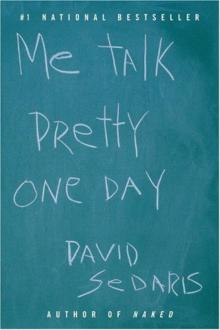 Me Talk Pretty One Day
Me Talk Pretty One Day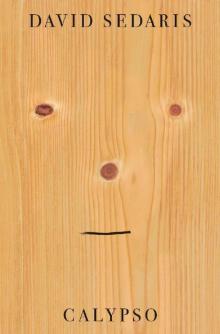 Calypso
Calypso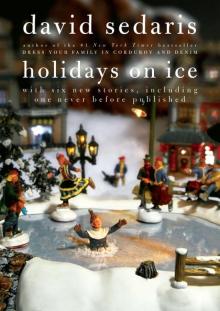 Holidays on Ice
Holidays on Ice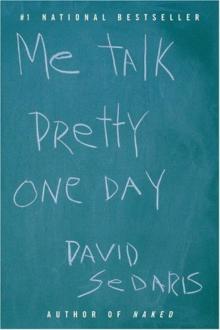 Mi vida en rose
Mi vida en rose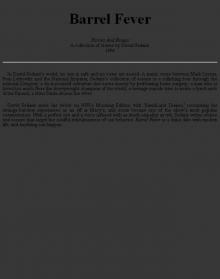 1994 - Barrel Fever
1994 - Barrel Fever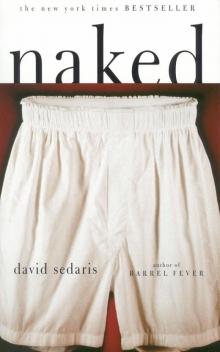 Naked
Naked Dress Your Family in Corduroy and Denim
Dress Your Family in Corduroy and Denim When You Are Engulfed in Flames
When You Are Engulfed in Flames Theft by Finding: Diaries 1977-2002
Theft by Finding: Diaries 1977-2002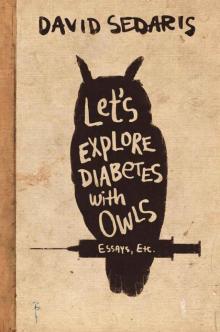 Let's Explore Diabetes With Owls
Let's Explore Diabetes With Owls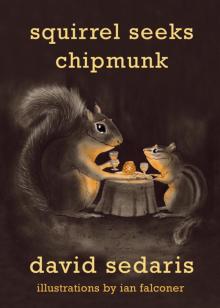 Squirrel Seeks Chipmunk: A Modest Bestiary
Squirrel Seeks Chipmunk: A Modest Bestiary Children Playing Before a Statue of Hercules
Children Playing Before a Statue of Hercules The Best of Me
The Best of Me Barrel Fever
Barrel Fever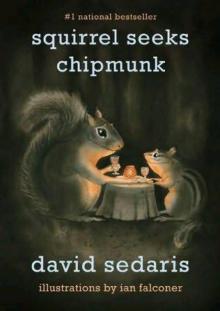 Squirrel Seeks Chipmunk
Squirrel Seeks Chipmunk Theft by Finding
Theft by Finding Barrel Fever and Other Stories
Barrel Fever and Other Stories